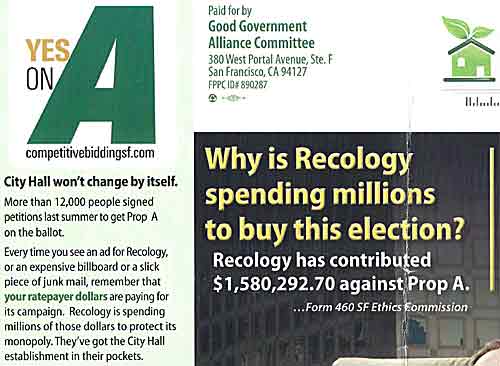
Yes on A campaign mailer.
By Luke Thomas
June 4, 2012
San Francisco-based garbage collection company Recology today accused a former Superior Court judge of violating campaign ethics laws.
In a complaint expected to be filed today with the Fair Political Practices Commission (FPPC) and the San Francisco Ethics Commission, Recology alleges retired Superior Court Judge Quentin Kopp failed to disclose the funding source of a recently landed political mailer in support of Proposition A, a local measure on tomorrow’s ballot that aims to reduce garbage collection rates via open, competitive bidding.
Kopp, who previously served in the State Senate and on the San Francisco Board of Supervisors, is a primary proponent of the ballot measure.
Recology’s accusation against Kopp has been leveled following allegations by a former Recology employee turned whistleblower who, in sworn testimony, accused Recology of fraud and embezzlement of taxpayer funds. Two related civil lawsuits have been filed against Recology, one of which has been filed on behalf of the State of California.
“Since Prop A closed their campaign committee for lack of funding, we’ve been on the look out for inappropriate expenditures and sure enough – the last minute blitz of mail paid for by Waste Solutions,” said No on A campaign consultant Gale Kaufman in a statement released by Singer Associates, Recology’s public relations firm. “You would think Quentin Kopp, a former Judge, who funneled this money through a long dormant committee he controls would know the Ethics Laws and would abide by them.”
According to documents filed with the San Francisco Ethics Commission, California Waste Solutions, Inc, a recycling company that stands to benefit if Prop A passes, contributed $25,000 on May 18 to the Good Government Alliance Committee, a previous candidate-controlled committee formed by Kopp in 1989 that was amended May 24 to function as a general purpose committee. The contribution was used by the Committee to produce and distribute a targeted citywide mailer in support of the ballot measure.
As required by FPPC regulations, the Yes on A mailer properly cites Good Government Alliance Committee as the mailer’s funding source. But Recology’s legal complaint argues, “Given that the Committee’s only activity this year has been in support of Proposition A, it should have amended its name and campaign reports to show it is a primarily formed committee supporting Proposition A.”
Responding, Kopp said both legal counsel and the Committee’s treasurer reviewed campaign ethics laws before amending the Committee’s statement of purpose and sending out the mailer.
Asked to comment on the accusation and statement released by Singer Associates, Kopp said, “It’s typical of Sam Singer and his lackeys who are part of a $2 million campaign similar to the 1 percent versus the 99 percent.”
Asked to comment on the complaint, San Francisco Ethics Commission Deputy Director Mabel Ng said she could neither confirm nor deny the existence of the complaint.



 The Hunger Site
The Hunger Site
June 6, 2012 at 9:27 am
Isn’t Quentin Kopp’s son Shepard the lawyer of “Sheriff Ross”? Is this the same Shepard having problems with the State Bar? “SHEPARD S. KOPP [#174612], 43, of Los Angeles was suspended for two
years, stayed, placed on two years of probation with an actual 30-day
suspension and was ordered to take the MPRE and prove his
rehabilitation.”
Humm the apple doesn’t fall from the tree…
June 5, 2012 at 5:43 am
I love they way Quentin Kopp has joined Occupy to complain about the 1% – Quentin – you are the 1%!
June 4, 2012 at 4:13 pm
I love the dig at “Sam Singer and his lackeys…” If Mr. Singer is handling the PR for someone, they tend to invariably be liars and villains.
You go, Quentin!
June 4, 2012 at 1:42 pm
I support competitive bidding, but not to 5 different companies, and that is why i am voting no. I sure hope Recology realizes that there are other reasons to vote no on this, and do not think that their money influenced my vote one bit!
June 5, 2012 at 12:30 pm
Terrie, We already established that there are 5 *contracts*, not 5 companies.
There will most likely be only two or three companies that will bid for the contracts.